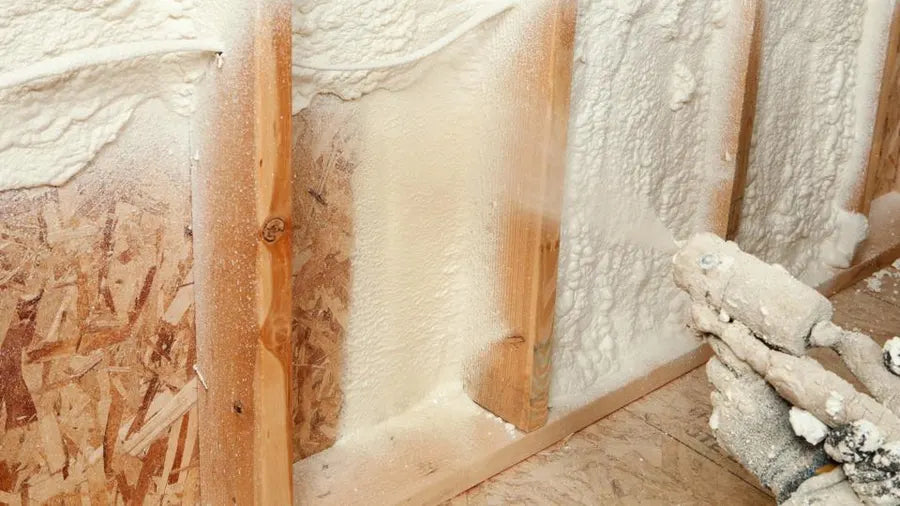Is Spray Foam Insulation a Good Idea? Find Out Now
Lately, many homeowners are looking at spray foam insulation as a way to keep their homes cozy while cutting energy costs. Yet, this method is raising concerns. Mortgage lenders and experts in the field fear the risks of using spray foam insulation. Now, Britain's largest mortgage provider, the Nationwide Building Society, wants proof of correct installation before approving a loan. Some other lenders don't need to consider it an option.
So, what's all the fuss about? Is using spray foam insulation in your home a wise choice? Let's examine its benefits and downsides to find out.

Key Takeaways
- Spray foam insulation can significantly improve energy efficiency, with a higher R-value than traditional insulation materials.
- However, improper installation can lead to structural damage and expensive repairs down the road.
- Spray foam insulation costs more upfront than other insulation options but may provide long-term savings on energy bills.
- Some mortgage lenders are wary of spray foam insulation and may require additional documentation or even refuse to approve mortgages with this type of insulation.
- Consulting with a professional insulation installer or surveyor is crucial to ensure spray foam insulation is the right choice for your home.
Understanding Spray Foam Insulation
Spray Foam Insulation is a smart choice for warm, efficient homes. It's a mix of isocyanate and polyol resin. When you spray it out, it expands and makes a strong cover. You can use it on walls, roofs, lofts, and more. This keeps your home snug all year. VB Insulation sells two types: open-cell and closed-cell.
Types of Spray Foam Insulation
Open-cell SPF is softer and more flexible, so it's easier to remove. Closed-cell SPF is tough and keeps most air and moisture out, making it harder to remove than open-cell foam.
Open-Cell vs. Closed-Cell Spray Foam
The choice between open-cell and closed-cell foam depends on your needs. Open-cell foam has an R-value of about 3.5 to 3.6 per inch, which means it gives an R-13 in a 2x4 wall or an R-19 in a 2x6 wall. Closed-cell foam has an R-value of up to 6.5 per inch. It's better for insulation, though. Open-cell foam costs $0.45 to $0.65 per board foot, while closed-cell foam costs $1 to $1.50 per board foot.
| Characteristic | Open-Cell Spray Foam | Closed-Cell Spray Foam |
|---|---|---|
| R-value per inch | 3.5 to 3.6 | Up to 6.5 |
| Cost per board foot | $0.45 to $0.65 | $1 to $1.50 |
| Flexibility | More flexible and soft | Sturdier and more rigid |
| Moisture resistance | Less resistant | More resistant |

Advantages of Spray Foam Insulation
Spray Foam Insulation is a top pick for many homeowners. It improves your home's energy efficiency, resulting in big savings on your energy bills. VB Insulation's spray foam is also super flexible and strong—way better than old-fashioned insulation.
Energy Efficiency and Cost Savings
Spray foam is great at keeping your home's temperature stable. It stops warm or cool air from escaping. This means your HVAC systems (heating and AC) can work less hard. As a result, you save a lot of money on your energy bills. It's a smart move for anyone wanting to make their home more energy efficient.
Read More: Cost of Spray Foam Insulation
Versatility and Flexibility
Spray foam can go almost anywhere in your house. It works in tight spots and odd shapes. So, you can insulate your attic, walls, or even roof with ease. This gives your home full protection against heat loss. Plus, it boosts your home's overall insulation against the weather.
Air Sealing and Moisture Resistance
Spray foam not only keeps your home cozy but also dry. It seals off gaps where air, moisture, and bugs could get in, stopping mold and mildew from growing. This improves your indoor air quality, making your home's living environment healthier and more comfortable.
Longevity and Durability
Once installed, spray foam can last a lifetime. It doesn't sag or wear out, so you won't need to replace it often. Your home stays warm in the winter and cool in the summer for years to come, saving you money on maintenance and keeping your insulation eco-friendly.
Spray foam is more than just an energy saver. Its sealing power and long life make your home safer and more sustainable. VB Insulation provides a product that goes beyond basic insulation. It helps you create the perfect living space, combining comfort, safety, and efficiency.
Read More: How long does spray foam last?

Potential Health and Safety Risks
There are health and safety risks to be aware of, too. The foam's chemicals can be harmful if not handled properly. It's crucial to have good ventilation and take safety measures during installation.
Impact on Property Value and Mortgages
Many banks and lenders are cautious about homes with spray foam. Incorrectly installed foam can decrease your home's value and energy efficiency rating. Some might need "documentary evidence" of proper installation before approving a loan. Others might not lend on homes with spray foam. This could make selling or refinancing your home harder in the future.
Factors to Consider Before Installing Spray Foam Insulation
Spray foam insulation is only sometimes the best choice. The type and age of your home matter a lot. Places near light or electrical boxes and door frames might not work. If you need more clarification, asking a pro can help you decide.
Property Type and Age
Spray foam might attract too much moisture, causing serious damage, such as decay or mold, to historic houses and old roofs. It's wise to talk to a surveyor before deciding. Other ways to insulate, like fiberglass or wool, are also available. Your choice will depend on what your home needs and what you can afford.
Installation Costs
While spray foam is great for saving energy, it's often pricier than other types. The up-front cost is significant. Still, over time, it could save you money on your energy bills. Think about all the costs, including installation and any repairs you might need later on.
Ventilation and Moisture Management
Installing spray foam incorrectly can harm your home. It might lower your indoor air quality or foster mold. This is why it's best to have a professional like VB Insulation do it. They'll make sure it's done right, with the right ventilation and moisture in mind.
Conclusion
Spray foam insulation is a top-notch way to keep your home cozy. It works better than fiberglass or organic insulation. It can cut your energy costs and last a long time, up to 80 years. But getting it installed costs more money. Also, it might only be right for some homes, like old or listed buildings.
Before you choose spray foam, consider the possible problems. These could affect your health or the safety of your home. They might also affect how much your home is worth. Plus, you need to make sure your home can still breathe after it's done. Talking to a pro like VB Insulation can ensure everything goes well and is right for your place.
Spray foam is great for making your home more efficient and comfy. Yet, it's smart to do some homework and talk to the experts before jumping in. Consider both the good and the not-so-good points. This way, you can pick what's best for your home and you.
FAQ
What is spray foam insulation?
Spray foam insulation starts as a mix of isocyanate and polyol resin. When it's sprayed, this mix expands, creating a barrier for insulating walls, roofs, and more.
What are the different types of spray foam insulation?
You'll find two main types of spray foam: open-cell and closed-cell. Open-cell foam is softer and allows more flexibility. Closed-cell foam is harder and blocks air and moisture better.
What are the advantages of spray foam insulation?
Spray foam insulation has many benefits. It boosts energy efficiency and saves money. It fits many areas, seals air, resists moisture and lasts a long time.
What are the potential drawbacks of spray foam insulation?
However, spray foam has a few downsides. It's more expensive to install, and incorrect installation can lead to health and safety issues. If not done right, It could also reduce a property's value.
Where should spray foam insulation not be used?
Avoid using spray foam near electrical boxes, in closed spaces, or old buildings. It might harm the structure and lead to decay and mold.
How does the cost of spray foam insulation compare to other insulation types?
Installation is pricier than traditional insulation like fiberglass or mineral wool. However, it offers better energy efficiency. This leads to savings on bills over time.
What factors should I consider before installing spray foam insulation?
Consider your property's type, age, and installation costs. Consider how it will affect ventilation and moisture. Get advice from a professional to make sure it's right for you.



